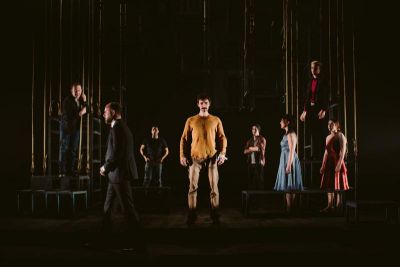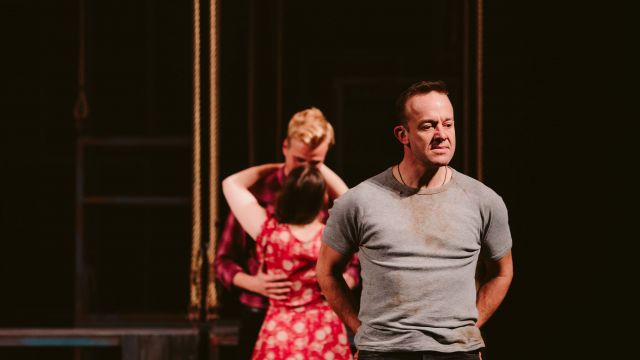A View from the Bridge
‘There was a future, a trouble which would not go away,’ says Alfieri, the lawyer of Arthur Miller’s classic tragedy, narrating a man’s attempts to stumble through love, loyalty and the awful impact his choices have on those he loves in an ever-changing world.
Miller wrote A View from the Bridge at a time when the United States was in a period of huge prosperity, when many immigrants were arriving, mostly from a still shell-shocked post-war Europe, to the promise of the ‘American Dream’. It’s brought to life more than sixty years later by SA’s State Theatre Company, with Kate Champion’s direction showing us both past and present relevance.
Eddie Carbone (Mark Saturno) works hard in the Red Hook docks of Brooklyn, New York, and lives with his wife Beatrice (Elena Carapetis) and their niece Catherine (Maiah Stewardson). The family take in two brothers, Marco (Dale March) and Rodolpho (Antonie Jelk), Beatrice’s Italian cousins and illegal immigrants, but Eddie’s stability is challenged by the growing relationship between Catherine and Rodolpho.
 Initially the 1950s family portrayed here seems out of place with its dominant and final-word father figure, but Champion and Saturno create a patriarchy that is recognisable today. It’s a world where the ‘man in charge’ tells everyone else what to do, what to say – and when not to say anything at all. Whilst Champion has given ambiguity to its place in time, she has chosen to keep the story in its Brooklyn origins and the sterling work of accent coach Jennifer Innes is evident here.
Initially the 1950s family portrayed here seems out of place with its dominant and final-word father figure, but Champion and Saturno create a patriarchy that is recognisable today. It’s a world where the ‘man in charge’ tells everyone else what to do, what to say – and when not to say anything at all. Whilst Champion has given ambiguity to its place in time, she has chosen to keep the story in its Brooklyn origins and the sterling work of accent coach Jennifer Innes is evident here.
Saturno’s Eddie is tremendous in his confused frustration of losing his grip on those around him: he can’t decide if he’s a father or an uncle, how he should love the niece he’s brought up like a daughter, why he can’t love his wife in the way she wants. His portrayal of a troubled man trying to make sense of those with other perspectives invades the heart, building love, pity and anger towards him. He shows us a man struggling with his loss of power, his nagging realisation of his feelings for Catherine, even his own sexuality. He shows us a man who can be both terrifying and vulnerable – indeed, being vulnerable makes him terrifying.
Carapetis is convincing as Beatrice, trying to keep the peace, nudging Eddie to realise his true feelings whilst keeping her own largely to herself. She is so strong in the household, holding the different strands of the story together, suffering through the actions and words of those around her – getting our sympathy, though it’s never asked for.
 Stewardson is a marvellous Catherine, flitting from child to flirt, with her uncle, then the new arrival Rodolpho. You can see her strength and independence in a growth spurt every time Eddie tells her what to do. She lights up when she sees the world through the eyes of a newcomer and is brilliantly uncertain, which is underlined by the excitement of her potential.
Stewardson is a marvellous Catherine, flitting from child to flirt, with her uncle, then the new arrival Rodolpho. You can see her strength and independence in a growth spurt every time Eddie tells her what to do. She lights up when she sees the world through the eyes of a newcomer and is brilliantly uncertain, which is underlined by the excitement of her potential.
The ‘Greek Chorus’ is Alfieri (Bill Allert), who seems to never leave the stage – lurking in the back of the family home, between the crates in the docks, or forefront in his lawyer’s office. He is wonderful in his portrayal of a man aware of his precarious position between the law of the land and that of the family.
Antoine Jelk is fabulous as Rodolpho: he interprets a different kind of man to the one Eddie knows: he likes to sing, wear good clothes and go to Broadway. Eddie doesn’t know how to describe him other than to tell everyone ‘he’s not right’, but Jelk’s illegal immigrant is so very comfortable with who he is. In Miller’s Brooklyn, he banishes cynicism with his big smile and innocence – and his chemistry with Stewardson is completely believable.
Dale March’s Marco is a solid yet mysterious man: he is family, honour and morality. And those come with dark edges that March reveals slowly at first, later exploding with huge force.
 There’s good support from Brett Archer and Chris Asimos as Eddie’s friendly workmates; and mean and menacing when they burst through the door as immigration officers.
There’s good support from Brett Archer and Chris Asimos as Eddie’s friendly workmates; and mean and menacing when they burst through the door as immigration officers.
Victoria Lamb’s wonderful set of skeleton crates and ropes defines every scene and is used cleverly with a few similarly designed benches to create a living room or a bedroom; there’s a dancelike movement of this furniture and those that sit on it. There are some great costumes designed by Enken Hagge: period-inspired but era-independent.
Chris Petridis’ lighting design with Meg Wilson starts with subtle verticals bathing the docks and sunrises to broad brush washes in the neighbourhood – it’s not showy, but truly adds to the performance. Sound design by Jason Sweeney is effective in building and maintaining the mood, at never far from the edge of darkness.
The production’s pace is achingly slow to start with, but that does mean we can digest everything we’re being fed. It gives us time to examine the different forms of love. It allows us to realise the immense value of listening to voices that others try to keep quiet; voices from those with a different perspective – women, young people, refugees, all those who don’t live their stereotype. It reminds us that there is a lot still simmering today, that there IS a future, a trouble which will not go away.
Mark Wickett
Photographer: Kate Pardey
Subscribe to our E-Newsletter, buy our latest print edition or find a Performing Arts book at Book Nook.

